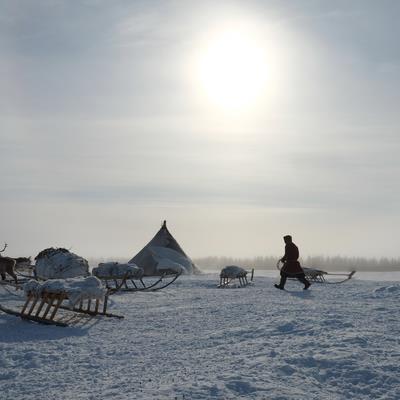jeanne gherardi
UMS3342 Observatoire des sciences de l'univers de l'UVSQ (OVSQ)
Guyancourt, France
3,267
Total downloads
16k
Total views and downloads
Submission closed
Arctic communities face a wide variety of upheavals, from short-term shocks to long-term trends and slow-burn issues such as changes in sea ice extent and thickness, marine life, and sea levels. Climate change combined with social and economic crises, migration, and geo-political tensions lead to complex interacting disturbances, exceeding in some cases the current adaptive capacity of Arctic communities.
The concept of resilience has caught the attention of solution-oriented research with and within local communities in the Arctic. However, resilience can be interpreted in different ways. Various authors and actors highlight different aspects of resilience. Those multiple perspectives, interpretations and definitions lead to a diversity of meanings. This diversity and its consequences must be carefully taken into account when using the concept in intercultural, post-colonial, or colonial, contexts. In this call for papers, we mobilize the concept of resilience to grasp communities’ ability to tolerate disturbances and to recover to a desired state. In this Research Topic, we welcome contributions that explore how the concept of resilience is deployed in a respectful and meaningful way to understand and respond to accelerated changes in Arctic contexts. In the Arctic, multifaceted changes and disruptions are mainly analyzed using a global approach based on Western academic knowledge - mainly climate and environmental sciences - which tend to make local contexts, knowledge systems and specificities invisible (Bremer et al., 2019; Krauß, 2020). In these settings, following Meerow et al. (2016) we suggest that the use of external concepts such as resilience “might serve as a boundary object, with the acknowledgement that applying resilience in different contexts requires answering: Resilience for whom and to what? When? Where? And why?” Further, Wardekker (2016, 2018, 2020) shows that resilience is ‘framed’ in diverging ways, connected to different goals, values, policy options, knowledge & analytical approaches, and mechanisms of what makes a system or community resilient (‘resilience principles’). Resilience is therefore a concept that contains the necessity to make judgements and thus to choose who is entitled to make such judgements and why.
This necessity to include different perspectives and values requires scrutinizing whose voices are included. As Jonsson (2016, p. 1) underlined: “it is only when the indigenous attains the place of the subject telling the story that we can seriously claim to have a postcolonial narrative of the Arctic”. In Arctic regions, scientific narratives of changes tend to annihilate expressions of attachment to place, cultural values or local knowledge, and thus limit local forms of agency; for instance, the ability to make sense of one's own experiences and to act on one's own world (Nash, 2005). This limitation can be expressed in the form of epistemic injustice, where the definition of what matters (salience), who is able to participate in the production of knowledge (legitimacy) and how the results are evaluated (credibility) (Cash et al., 2003) belongs solely to scientists from ’Western’ backgrounds. In doing so, the scientific production process only reinforces pre-existing power imbalances, particularly those inherited from colonization. It is here suggested that narrative-based research, e.g., indigenous methodologies and Southern critical methodologies associated with storytelling or critical ethnography, contains the potential to nurture this much needed shift, opening up for pluralizing perspectives on resilience in a post-colonial context. Engaging a decolonial turn is therefore crucial.
Following Quijano & Ennis (2000), we seek to understand decoloniality within the close-knit relationship between the colonial condition and the imposition of a Western logic of ‘modernity’ as a consequence of colonialism. Hence, ‘decoloniality’ means to ‘delink’ ourselves from the structure of knowledge imposed by the West. This means disrupting the resilience with which Western scientific knowledge, concepts, and narrative forms shape indigenous and decolonial life-worlds (Veland et al. 2018). Place-based approaches that narrate with and within local communities - can explore resilience as a space that fosters indigenous and local agency in face of such disruption - offering salient alternatives to reform and decolonize the public discourses towards climate and environmental justice through reflexivity and the pluralization of perspectives. Indeed, this plurality fosters community resilience to climate change beyond the Arctic. This responds to a timely need and will support a fairer narration and local sovereignty on how to live in the Arctic in times of accelerated global changes.
By challenging classical and western-centered practices of Arctic climate adaptation research, this Research Topic aims to highlight inclusive and fair perspectives on resilience in the rapidly changing Arctic. We welcome contributions that constructively critique hegemonic representations of resilience that tend to make invisible what happens at the “margins” of mainstream Western science. This Research Topic is open to:
- Research adopting an explicitly decolonial approach aligned with culturally
anchored research;
- Research that helps to foster a pluralistic and fair dialogue between indigenous,
local and Western ways of knowing, Indigenous scholars with a perspective on
socio-environmental disruptions;
- Both empirical and conceptual contributions, from a regional scale;
- Disciplinary to transdisciplinary research that is qualitative and/or quantitative
Accepted contributions:
- Original Research, Mini Review, Policy and Practice Reviews, Perspective, Community Case
Study

Keywords: Arctic, resilience, decolonial, narratives, reflexivity
Important note: All contributions to this Research Topic must be within the scope of the section and journal to which they are submitted, as defined in their mission statements. Frontiers reserves the right to guide an out-of-scope manuscript to a more suitable section or journal at any stage of peer review.
UMS3342 Observatoire des sciences de l'univers de l'UVSQ (OVSQ)
Guyancourt, France
EA4455 Cultures, Environnements, Arctique, Représentations, Climat (CEARC)
Versailles, France
UMS3342 Observatoire des sciences de l'univers de l'UVSQ (OVSQ)
Guyancourt, France
EA4455 Cultures, Environnements, Arctique, Représentations, Climat (CEARC)
Versailles, France
Norwegian Research Institute (NORCE)
Bergen, Norway
Share on WeChat
Scan with WeChat to share this article
